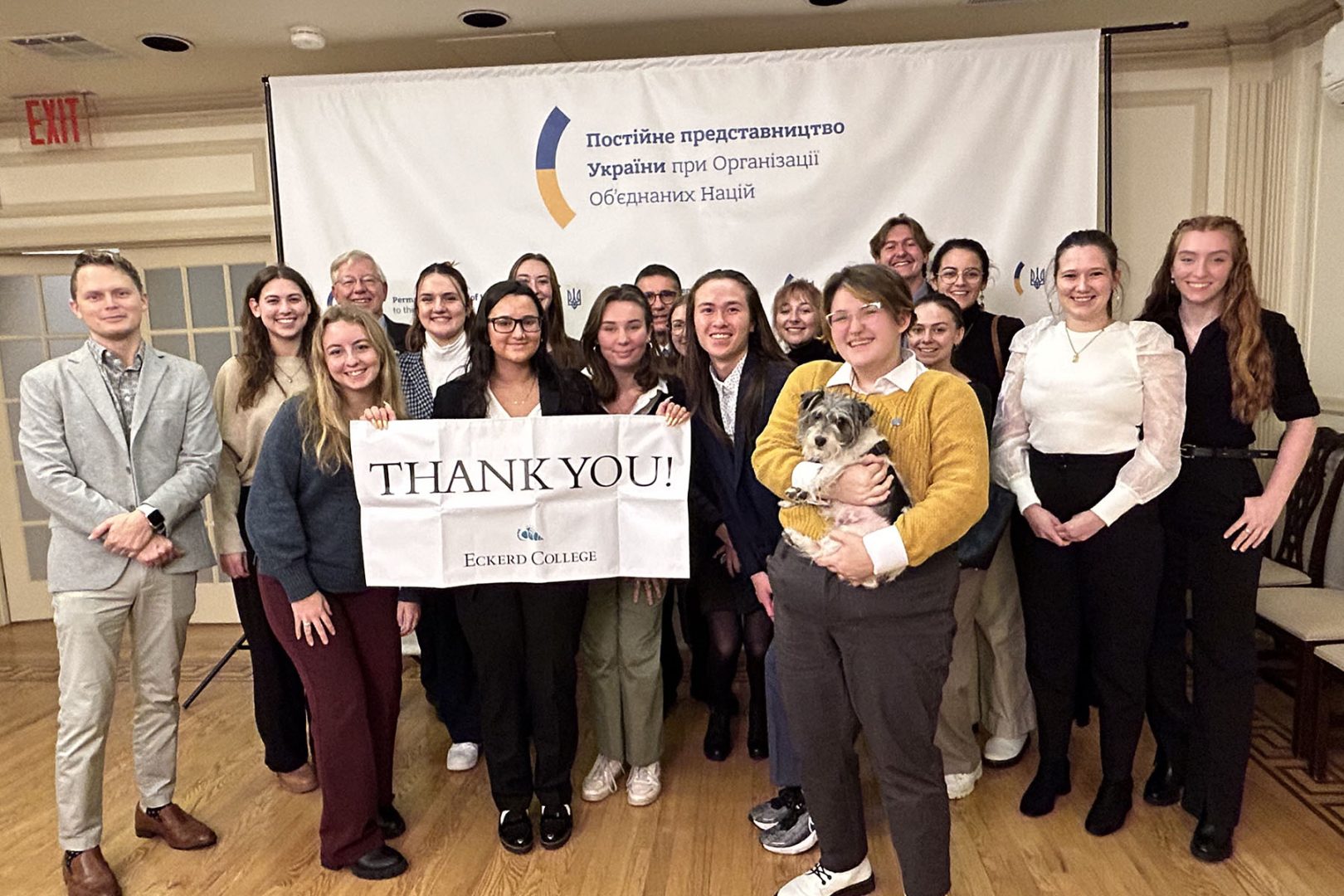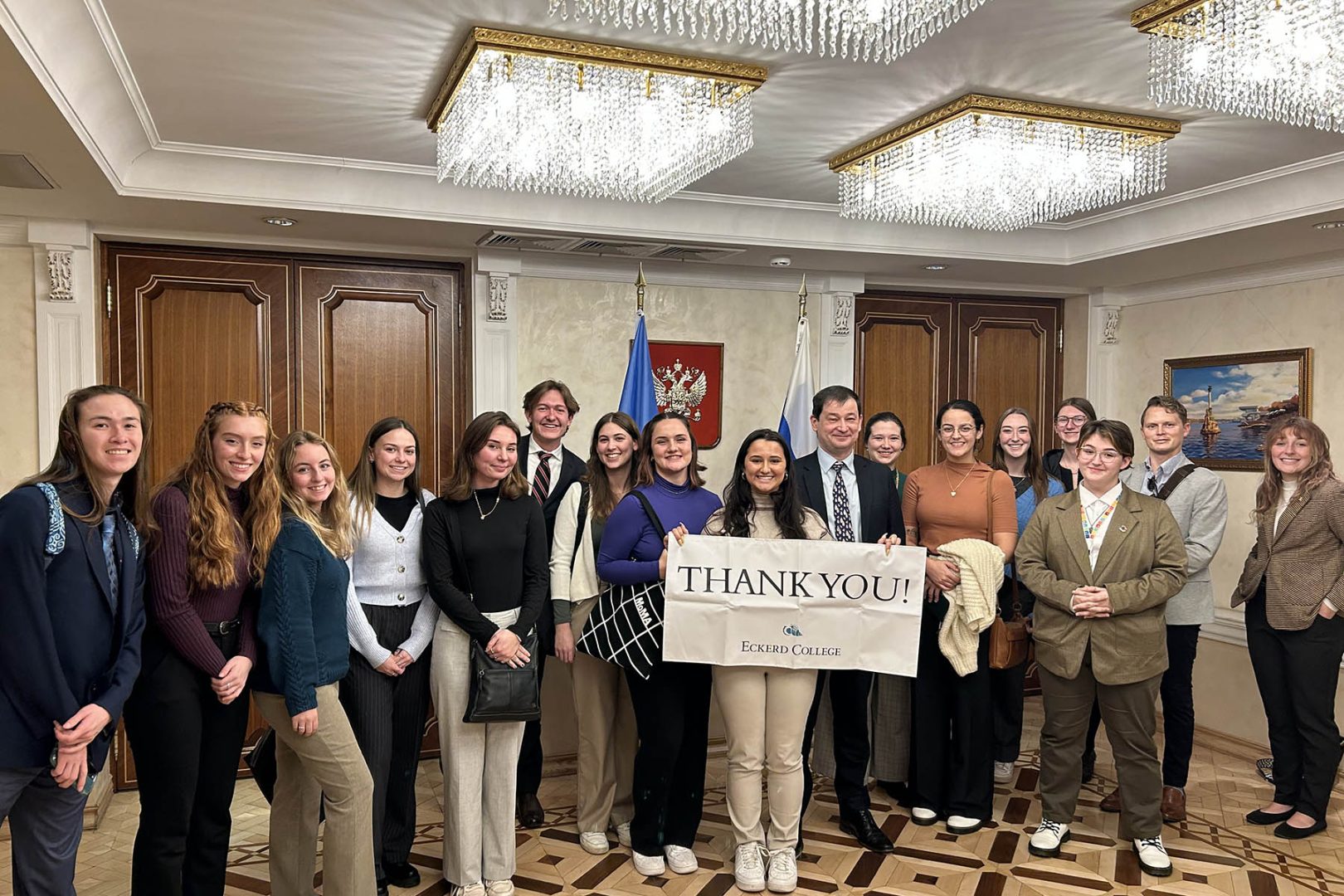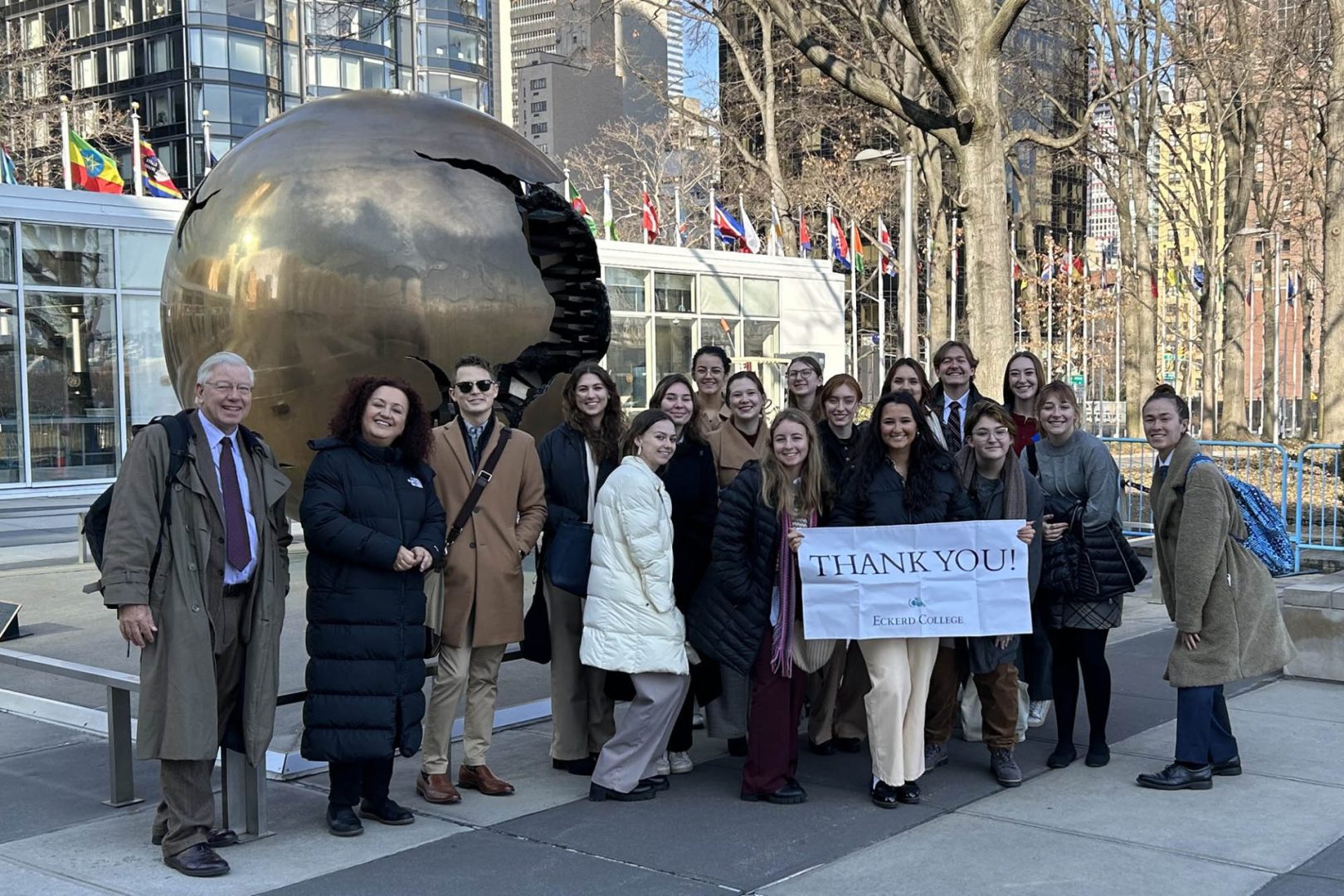It was the last meeting of the day—and the most jarring. Led by Anthony Brunello, Ph.D., professor of political science, and Neal Walker ’78, Eckerd’s diplomat-in-residence, a group of 16 Eckerd College students visited the United Nations headquarters in New York City last January as part of a Global Studies Winter Term course.
The group was ushered into a room to meet with Dmitry Polyanskiy, first deputy permanent representative to the United Nations for Russia, and several aides. The Russians had balked at meeting with previous Eckerd Winter Term groups; this would be the first in seven years. What happened next stunned most of the students.
“They had a PowerPoint presentation on their perspective of what they’re doing in Ukraine,” explains Christyna Reagan, a senior political science, women’s and gender studies, and American studies major from Concord, North Carolina. “They said the war was their only way to save Russian culture and that Ukraine was trying to eradicate it.
“The PowerPoint included a Tucker Carlson clip and maps from decades ago. We asked questions about war crimes and missile strikes and violations of women’s rights, and they said, ‘No, that’s not happening. This is a valid conflict.’”
Emma Rodriguez, a sophomore international relations and global affairs major from Hillsborough, New Jersey, says the Russians also referred to the war as a “special military operation, that they view NATO expansion as a grave threat, and that the war was Ukraine’s fault. We asked how Russia was fostering peace and security, and the representative told us that’s exactly what they’re doing.”
Afterward, Brunello says, the students were a little shaken. “The next morning Neal and I had a long session with them in the hotel lobby. Neal spoke to the outdated and twisted maps and other misrepresentations, and I spoke to them about how to interpret the kind of briefing we saw. And what we saw was a carefully crafted propaganda program.”
The next day, the Eckerd group met with Sergiy Kyslytsya, Ukraine’s ambassador to the U.N. Brunello says Kyslytsya “met with us personally. He came into the room and announced he had about 20 minutes because he had a meeting at the U.N. Security Council he must attend. But he stayed for nearly 40 minutes and told the students, ‘I am sure you have questions. Please, ask me anything.’ The entire briefing was based on student Q&A. He did not steer the meeting very much, although he had his own answers and perspective.”
Among other issues, the students asked Kyslytsya to address the violence against women and children during the war, what Ukraine wants and needs the most, and what victory would look like. His answer to the last question, Brunello says, “was that only after a fundamental change in Russia is a peaceful future possible. There are no healthy alternatives to Putin.
“The Ambassador then took time to talk with the students about the importance of history, and knowing history. Moreover, he suggested that all of us—in the entire world—are responsible for allowing Putin to become the dictator he is today.”
The goal of the course is for students to learn about the work of the U.N. through discussions with U.N. staff, delegates from member states, and representatives of international nongovernmental organizations. The main topics include the U.N.’s role in collective security, human development, humanitarian action, environmental sustainability and human rights. The primary objective is for students to personally participate in discussions concerning how the U.N. works toward a future of trust, peace and common decency.
Walker—who had a lengthy career at the U.N., including serving as the head of the United Nations in Ukraine from 2014–2018—facilitated the meeting with the Ukrainian ambassador, someone Walker had worked with while serving in Ukraine. “I give the students a lot of credit for being well prepared and well informed of the very different positions the two nations take,” Walker says. “And I was happy the students took the lead in questioning both sides.”
As for the persistent Russian claim that the war could have been easily avoided had it not been for NATO interference, “It’s like taking two teaspoons of truth,” Walker says, “and mixing it with a pitcher full of lies. To hear him [Polyanskiy] say this with a straight face … I know the students picked up on that.”
The emphasis should not be on deposing Putin, Walker adds, “but rather on defending the U.N. charter and respect for international laws and human rights so as to generate a global consensus. It’s not up to the U.S. to remove Putin from power. It’s about generating global support to put pressure on Russia.”
Brunello also used his contacts at the U.N. to help facilitate meetings. “China and Russia had turned us down in the past,” he explains. “I think the Russians clearly wanted to have an audience to pitch their views. And they may have figured out that we were going to speak with the Ukrainians the next day.”
Brunello adds that the Russian Mission had seen previous Eckerd College groups up through 2016. “But during the next trips in 2018 and 2020, they declined to see us. So for me personally, after approximately six to eight prior visits there, this briefing was totally unlike all the others in the level of the propaganda and the effort really to persuade this audience.”
The Eckerd group also met with U.N. representatives from Italy, Germany, France, Brazil, Cuba and Palestine, which is not a member nation but maintains an observer mission at the U.N. Brunello says officials from the U.S. Embassy told him Eckerd is the only college in the country with a program like the one he and Walker lead. “They said nobody else does what we do.”
Sifting through the rhetoric and scripted messages to get to the truth is something Brunello and Walker try to teach their students. “At the mission briefings they can, and have always, varied in the degree to which you hear objective or forthright perspectives and analysis,” Brunello says. “There is usually a balance. For example, the U.S. Mission can be disingenuous or bland, while others, like the Cuban Mission, might be more colorful. But they will always express perspectives that align with their national policy, positions and values. Having said that, you can hear between the lines.
“The Italian Mission, for example, made it clear that Italian foreign policy and U.N. policy will steer a consistent course as in the past. The Meloni government, like other governments, will one day change, but the foreign policy does not. So this is an experience where students get a chance to develop their ‘hearing’ and listening.”
Sofie Alexander—a senior political science and chemistry major and an Eastman Leader from Jersey City, New Jersey, whose grandfather was a diplomat to the U.N. from the United Kingdom—notes that the Eckerd group “was still not hearing about the carbon emissions that are created by making batteries for electric cars, or nuclear power plants and what they do with nuclear waste. But it was very encouraging to see so many people working so hard every single day to assure our safety and our freedom.”
“This is the first time I’ve had this kind of experience from someone at such a high level of diplomacy,” adds Madi Ryan, a junior political science major from Denver, Colorado, referring to the Russian representative. “It was quite shocking to see someone so blatantly lie. They are essentially PR representatives. That’s the best way to put it.
“But I think the U.N. can definitely help in the long run, and the importance of meeting with us and others like us is really essential.”















